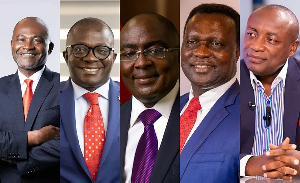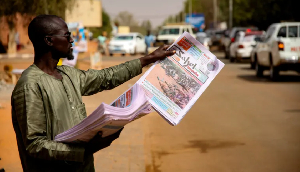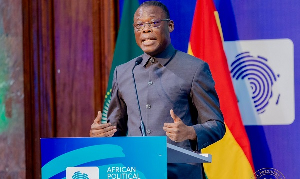On any day of the week, you can be very certain that when President Addo Dankwa Akufo-Addo trots out any figures capturing the rancid and wanton rot that is the legacy bequeathed him by his predecessor, namely, former President John Dramani Mahama, he will be doing so based on accurate and reliable statistics generated by experts who have absolutely no vested interest in the fortunes of either major political party in the country, but the objective truth of the economic reality on the ground. We must also bear in mind the fact that the academic and professional integrity and credibility of these experts are at stake here.
Which is why Mr. John Jinapor, the former Mahama Deputy Energy Minister, could only be jiving or testing the extent of his cognitive obtuseness or clinical lunacy when he smugly and cavalierly challenges figures generated by experts at the Institute of Statistical, Social and Economic Research (ISSER), indicating that the Mahama-led regime of the National Democratic Congress (NDC) put the country into a Stygian economic sinkhole during the 4 protracted years that the NDC presided over the erratic supply of energy in the country, globally known as “Dumsor.”
ISSER figures quoted by President Akufo-Addo at the recent National Policy Summit (NPS) put the figure at $ 3 Billion in lost economic and employment opportunities (See “Mahama Gov’t Didn’t Lose $ 3 Bn to Dumsor – John Jinapor” iGhanaian.com 8/15/17). He is testing his madness because Mr. Jinapor deliberately pretends as if these figures were concocted by operatives of the Research Desk at the headquarters of the ruling New Patriotic Party (NPP). But his vacuous impugnation of the President’s figures strikingly attests to the abjectly poor caliber of the people who jampacked the rag-tag cabinet of the Mahama government.
In 2014 alone, ISSER, the Ghanaian institutional equivalent of Harvard in statistical and economic research, reckons that the country lost at least GH? 618 million in economic activities, which translates into about 2-percent of the nation’s Gross Domestic Product (GDP). Now, that is a rather conservative figure, if the reader were to enquire of yours truly. It is an open-secret that at least 5-to-10-percent of small- and medium-sized businesses in the country effectively went under. But, of course, Mr. Jinapor has the luxury and temerity of his fellow Gonja clansman, because the former Energy Minister second-bananas knows where his proverbial butter – in this case, perhaps, his Tuo-Zaafi – is buttered.
He also fatuously argues that when the figure $ 618 million – he actually scales it down to $ 600 million – is multiplied by 4, or the entire 4-year official tenure of the Mahama regime, one arrives at the considerably lower figure of $ 2.4 billion in loss of entrepreneurial income. Such an argument, of course, is inexcusably absurd, because it falsely and facilely assumes an annual uniformity of business losses. Even a passably savvy high school-level student of economics knows that this mischievous or Kwaku Ananse approach to “Arithmetic,” as an insolent Mr. Jinapor chooses to cast it, is “wacky” or logically unsound, in American street language.
Very likely, these figures fluctuated between a minimum base of $ 600 million to about $ 700 million every year. ISSER actually puts the yearly average figure at $ 686 million, which eloquently bears out my rather casual observation that the yearly percentage of business losses in GDP terms, as provided by ISSER, is clearly very conservative. Mr. Jinapor also cynically claims that during the whole of 2016, the country did not experience any remarkable shortages of energy supply. Here, he conveniently fails to add that if there was any energy glut in the system, it was inescapably because 2016 was a landmark election year, which means that the Mahama rat-pack had its sights set far more on the ballot box than any self-conscious demonstration of selfless motivation or newfound administrative competence.
No wonder, then, that the overwhelming majority of Ghanaian voters reckoned it to be an unforgivable affront to their intelligence. Indeed, were he that half-smart, as he would have his audiences believe, Mr. Jinapor would have taken his fight over the statistical accuracy, or the woeful lack thereof, of the figures published by ISSER to the operatives of the latter institution itself, and not so scandalously to President Akufo-Addo.
*Visit my blog at: kwameokoampaahoofe.wordpress.com Ghanaffairs
By Kwame Okoampa-Ahoofe, Jr., Ph.D. English Department, SUNY-Nassau Garden City, New York August 17, 2017 E-mail: okoampaahoofe@optimum.net
Opinions of Tuesday, 22 August 2017
Columnist: Kwame Okoampa-Ahoofe, Jr., Ph.D.















